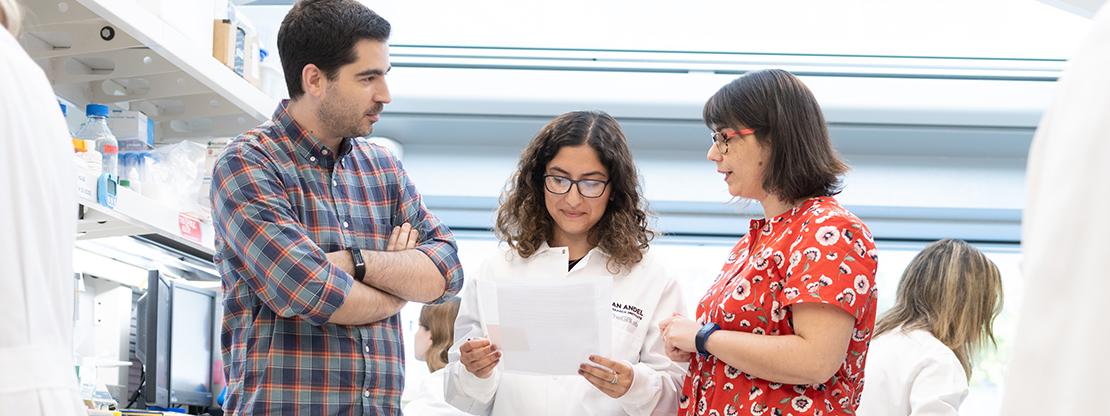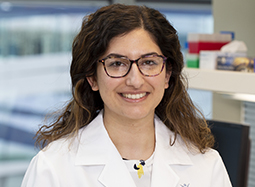Graduate student spotlight: Illuminating the genetic roots of dementia in understudied populations
July 26, 2021

Throughout the year, we highlight Van Andel Institute Graduate School’s doctoral students. This month, we’re featuring Nadia Dehghani, a Ph.D. student in the labs of Dr. Rita Guerreiro and Dr. José Brás. Most studies that investigate the genetic mechanisms underlying dementia occur in people of European descent. Nadia’s studies seek to understand the genetic contributors to dementia in more populations to improve the representation of our diverse world; such studies provide powerful and applicable insights into the diseases that cause dementia. Nadia will present her work at the 2021 Alzheimer’s Association International Conference this week.
How would you describe your area of study to your grandmother?

ND: I frequently go to my grandmother for perspective on the importance of our area of study – genetic characterization of dementia in understudied populations such as the Turkish. Prior to her recent retirement, my grandmother was Head Carer at a Residential Home for elderly people with dementia. This work involved developing individual care plans, and promoting reminiscence and independence. Additional factors such as the importance of family involvement, and the effects of different medications is also a topic of interest. Therefore, my Mamani fully recognizes how individuals living with dementia are impacted. I think it’s really special to be able to share our work with my family through either invitation to virtual presentations, or recent publications — especially considering they are so invested behind-the-scenes.
What is your primary motivation for persevering through graduate school?
ND: I followed Dr. Rita Guerreiro and Dr. José Brás to VAI from London because their lab fosters a stimulating and supportive environment that I wanted to grow in. The Guerreiro and Brás labs have made vast contributions to our understanding of neurodegenerative diseases, and I wanted in on this action! My journey so far has already allowed me to collaborate with clinicians from countries across the world including Turkey, Finland, the U.K., U.S., and Portugal — knowing that the findings from our work may provide direct insights for individuals afflicted by such diseases motivates me to conduct analyses with a sense of urgency and keep up to date with advances in the field. My degree will allow me to continue this important work, and support future scientists in a similarly fruitful manner.
Did your past experiences in life or education help prepare you for graduate school or did you have to develop different strategies to succeed?
ND: My past experience was that if I hide in the back of the lecture theatre and take notes, I could “figure out” what was happening afterwards. Van Andel Institute Graduate School challenged me to literally stand up in front of everyone and share what I know, and what I need to find out, in order to solve the problem in hand; it was only here where I truly learnt how to learn.
Do you think there is any value in social networking with other graduate students in non-related fields?
ND: One of the most unique aspects of our graduate program is that we all know each other; this fosters a great sense of belonging which translates to “unconditional” intellectual and emotional support. Key figures for me, personally, are my Grad-father Eric Cordeiro-Spinetti, and fairy Grad-mother Maggie Chassé. Their work spans the fields of epigenetic regulation of cardiac and skeletal myogenesis and therapeutic targeting of pediatric cancers, respectively. The nurturing of scientists by VAI makes for a very bright future!
What accomplishment (academic or other) are you most proud of?
ND: I am proud of the important and collaborative work that I have contributed to; through my expert colleagues, I have developed my aptitude for bioinformatics, biostatistics, and sequencing technologies. I have applied these skills to better understand the genetic features of different forms of dementia, specifically in analyses of copy number variance and rare variants within extended regions of homozygosity.
What do you want to do with your degree?
ND: With my degree, I hope to continue using -omics to better understand the mechanisms contributing to disease, with the goal of identifying factors which can be translated to improve human health. Already, I can see that my graduate school experience is preparing me for becoming a leader in biomedical research, and I’m excited about where my journey will take me next!
If you were asked to put something in a time capsule for each year you have been in the program and this capsule would not be opened for 25 years, what would you contribute?
ND: First year: Bioinformatics textbook. I won’t need to refer to this for >25 years since I soon discovered that I learn best when I have a real-life problem to solve and can modify the code I have previously encountered in order to achieve this.
Second year: Zoom. Most of our lives since early 2020 has been conducted on this platform, and whilst necessary and not-entirely-awful, I look forward to embracing in-person interactions soon.
Interested in Van Andel Institute Graduate School? Learn more at vaigs.vai.org and read previous student spotlights here. Read more about the M.D./Ph.D. program here.